|
Distributed Systems GroupUbiquitous Computing InfrastructuresProf. Friedemann Mattern[Also
available as a PDF document. For a more detailed list of activities, visit our Research Topics overview.]
Of particular interest is the field of ubiquitous computing, which aims at making computers available throughout the environment, while rendering them effectively invisible. One of the main goals is to incorporate computing power into everyday objects in order to create "smart things" real-world objects that provide novel ways of accessing information, react to their environment, or provide new emergent functionality when interacting with other smart things. This vision of ubiquitous computing is grounded in the belief that microprocessors and advanced sensors will soon become so small and inexpensive that they can be embedded in almost everything. It is expected that billions of such objects will be interwoven and connected together by wireless networks, forming a world-wide distributed system several orders of magnitude larger than today's Internet. To enable communication and cooperation among smart objects, new information infrastructures are required. They have to cope with a highly dynamic environment and should, among other things, provide location information to mobile objects, represent context information, and enable reliable and scalable service creation. The Distributed Systems Group addresses the challenges of designing and implementing such infrastructures. Middleware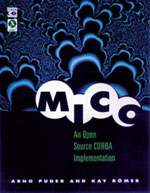 Figure 1: MICO is a
widely used open source CORBA implementation.
Application development for distributed systems relies on software frameworks and middleware systems that provide high-er-level abstractions. Based on our experience with the open source CORBA implementation MICO, we are exploring novel middleware approaches for dynamic networks of resource-constrained mobile computing devices. In particular, we are working on middleware concepts for sensor networks and smart cards, and on frameworks for remote identification of real-world objects. Smart Devices
Figure 2: The Smart-Its project was one of 16 projects
conducted under the European Union's Disappearing Computer initiative, whose
aim was to explore how everyday life can be supported and enhanced through the
use of collections of interacting artifacts.
We participated in the European Smart-Its project whose goal was to develop unobtrusive, deeply interconnected smart devices that can be attached to everyday items in order to support new functionality, novel interaction patterns, and intelligent collaborative behavior. Eventually, Smart-Its should be as cheap and as small as state-of-the-art radio tags (RFIDs), but in addition they will also be able to communicate with peers, and they will be customizable in their behavior. In order to facilitate a meaningful integration in their environment, Smart-Its are equipped with various sensors providing context information. Building on our experiences in the Smart-Its project, we are participating in the MICS (Mobile Information and Communication Systems) National Center of Competence in Research (NCCR). The Center studies fundamental and applied problems that are raised by new types of mobile communication and information services and devices. Together with other research groups at ETH Zurich and EPFL we are working on software architectures and infrastructures for mobile networks of smart, location-aware devices. The BTnode platform, consisting of a microprocessor, a Bluetooth radio, and various sensors is used as the basis of several prototypes built within the scope of this project. 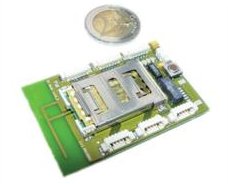
Figure
3: The second generation of Smart-Its prototypes, called BTnodes, are based on
an Atmel microcontroller with 128 kB of in-system programmable flash memory and
64 kB of SRAM. Bluetooth modules allow communication between different devices.
Sensor NetworksA sensor network consist of a large number of tiny autonomous computing devices, each equipped with sensors, a wireless radio, and a processor. Sensor networks are envisioned to be deployed unobtrusively in the physical environment in order to monitor a wide range of environmental phenomena with unprecedented quality and scale. The close integration of sensor networks with the physical world imposes a number of challenging research problems. Our group is working on basic issues such as energy-efficient and scalable time synchronization and localization of sensor nodes, as well as on higher-level mechanisms for integrating these basic services into a common framework for the development of applications for sensor networks. For practical experiments we use collections of cooperating BTnodes. Implications of Ubiquitous Computing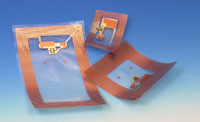
Figure
4: A typical RFID tag has the size and flexibility of an address label and
allows remote reading and writing from up to several meters without requiring
line of sight. The rising use of RFID tags in both industry and retail has led
to a number of controversies over the impact of ubiquitous computing on society.
Ubiquitous computing technologies will have a strong impact on future society. In a project funded by the Gottlieb Daimler and Karl Benz Foundation, an interdisciplinary group of researchers explores its social, economic, and legal implications. One of the main tasks is to communicate these findings to relevant groups in society and politics. Within the project we are also developing scenarios and building prototypes, demonstrating new types of human-computer interaction. Security and privacy will be of prime concern in a world of highly interconnected, invisible devices that will eventually permeate our everyday lives. We are working on a privacy-aware infrastructure (based on P3P, a W3C Web standard for exchanging privacy policies) that is able to keep track of any ongoing data exchange, while providing the user with powerful means to selectively manage such collected personal information. Also, with the growing number of interacting devices and smart appliances, the probability of failure for any single device increases. We are therefore investigating the role of redundancy and fault-tolerance in ubiquitous computing, with the goal to provide concepts for reliable infrastructures and services. Business Applications
The M-Lab, a joint venture with the University St. Gallen, was created to bring the ideas of ubiquitous computing into companies that could profit from the availability of smart devices, radio frequency identification, and related technologies. We are focusing on areas such as logistics, retail, life sciences, and automotive. The M-Lab brings together researchers from academia and practitioners from industry, contributing to the research area and creating competitive advantage. TeachingBesides teaching fundamentals of distributed systems, distributed algorithms, and Internet technology, our graduate level curriculum focuses on state-of-the-art research in ubiquitous computing. Lectures are accompanied by hands-on programming experience. In-depth seminars allow students to individually research and present fundamental works in the field, as well as investigate recent developments. In our Ubicomp Lab, students can devise and build their own smart environments using handheld devices, ID systems (e.g., smart cards or RFID tags), and wireless communication equipment such as Bluetooth or WLAN. More information on the Distributed Systems Group is available at http://www.vs.inf.ethz.ch/
|
|
|
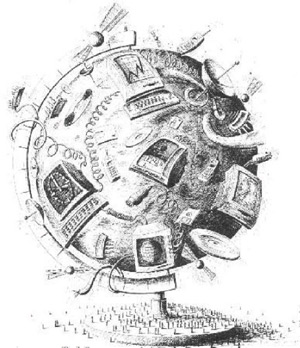 The Distributed Systems Group conducts research in distributed algorithms,
Internet applications, middleware systems, and concepts to enhance reliability,
security, and privacy in distributed systems.
The Distributed Systems Group conducts research in distributed algorithms,
Internet applications, middleware systems, and concepts to enhance reliability,
security, and privacy in distributed systems. 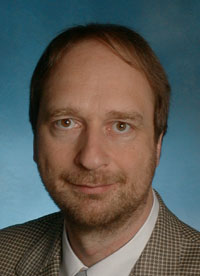 Friedemann Mattern
studied computer science at the University of Bonn and became a Faculty
Research Assistant at the University of Kaiserslautern in 1983. He obtained his
Ph.D. in 1989 with a thesis on distributed algorithms. From 1991-1994 he was
Professor of practical computer science at Saarland University, Saarbrucken,
and from 1994-1999 Professor of practical computer science and distributed
systems at Darmstadt University. He was appointed full Professor at the ETH
Zurich in July 1999.
Friedemann Mattern
studied computer science at the University of Bonn and became a Faculty
Research Assistant at the University of Kaiserslautern in 1983. He obtained his
Ph.D. in 1989 with a thesis on distributed algorithms. From 1991-1994 he was
Professor of practical computer science at Saarland University, Saarbrucken,
and from 1994-1999 Professor of practical computer science and distributed
systems at Darmstadt University. He was appointed full Professor at the ETH
Zurich in July 1999.